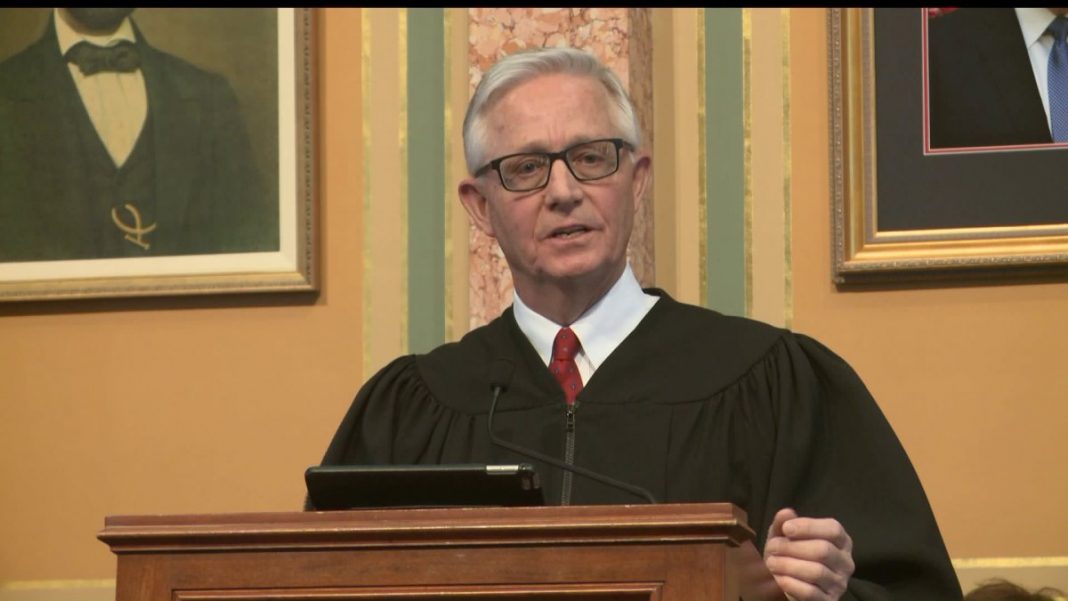***This article is only being published after months of trying to get answers. The Iowa Standard’s open records request was sent May 10. We received a reply May 21 with information on cost, etc. There was never a mention of withholding any documents. It wasn’t until receiving the records we were told some would be withheld. On June 19 we followed up with questions seeking how many documents were being withheld and how/why the exemptions applied to them. Those questions are yet to be answered as of July 30.***
To hide his political maneuvering against judicial selection reform, the Chief Justice of the Iowa Supreme Court is gutting Iowa’s open records laws. He and his staff are claiming that all communications between him, Justice David Wiggins and his key legislative staffers are exempt from disclosure.
It’s a move that, if followed by other government officials, will restrict the public’s access to internal communications.
All this despite the Iowa Supreme Court being adamant that records be open to the public unless there is a specific exemption permitting confidentiality.
Last month, The Iowa Standard reported that Chief Justice Mark Cady and his staff secretly helped coordinate opposition to reforms of Iowa’s judicial nominating process. The Chief Justice had his staff tell the public that the judicial branch was neutral on the bill, but behind the scenes they were working with the Iowa State Bar Association and other lobbying organizations to stir up grassroots opposition.
We know just a little bit about that coordination, based on emails between Cady, his staff and leaders of the Bar Association.
However, Cady is hiding all communications from December 1, 2018 through May 31, 2019, between Cady, Wiggins and court staffers Molly Kottmeyer and Caitlin Jarzen that contain the phrase “judicial selection.”
Cady claims all these internal communications “are protected by attorney-client privilege (Iowa Code 622.10 (1)), attorney work product doctrine (Iowa Code 22.7(4)), and deliberative process privilege (Iowa Code 22.7(65).”
Cady and his staff have refused to provide any further explanation for refusing to produce the documents, and they have refused to even say how many pages or documents they are withholding.
We are only left to wonder what legitimate reason Cady could have for hiding these records or whether he is violating the law.
The emails and other communications likely discuss Cady’s attempted efforts to defeat the judicial selection reform bill.
How are those records protected by the attorney-client privilege and work product doctrine? Was Cady planning to sue to stop the law? Was he coordinating with the legislators who filed a legal challenge against the bill?
Randy Evans, executive director of the Iowa Freedom of Information Council, says that Iowa Code section 22.7(65), what Cady calls the “deliberative process privilege,” only allows officials to keep drafts confidential before they are used in formulating a decision. Cady formulated and executed his plan a long time ago, so the exception should not apply any longer.
Cady seems to be expanding this exemption beyond the letter of the law, but any dispute over Cady’s actions would end up in Cady’s judicial branch, making a legal challenge difficult.
The effect of Cady’s actions will go far beyond this case. Now that the head of the judiciary has decided that internal communications have a blanket exemption, and no further explanation needs to be provided, other government officials will follow his lead.
Cady is the chief justice who has again and again promised that the judiciary would be transparent. Now that he has blown a hole in Iowa’s transparency law, it’s clear that Cady is more politician than judge.
Evans told The Iowa Standard that the exemption Cady is relying on, even when it applies, does not require that officials keep their documents secret.
What does Cady have to hide? That is what others should start asking. His staff has refused to answer The Iowa Standard’s follow-up questions.












